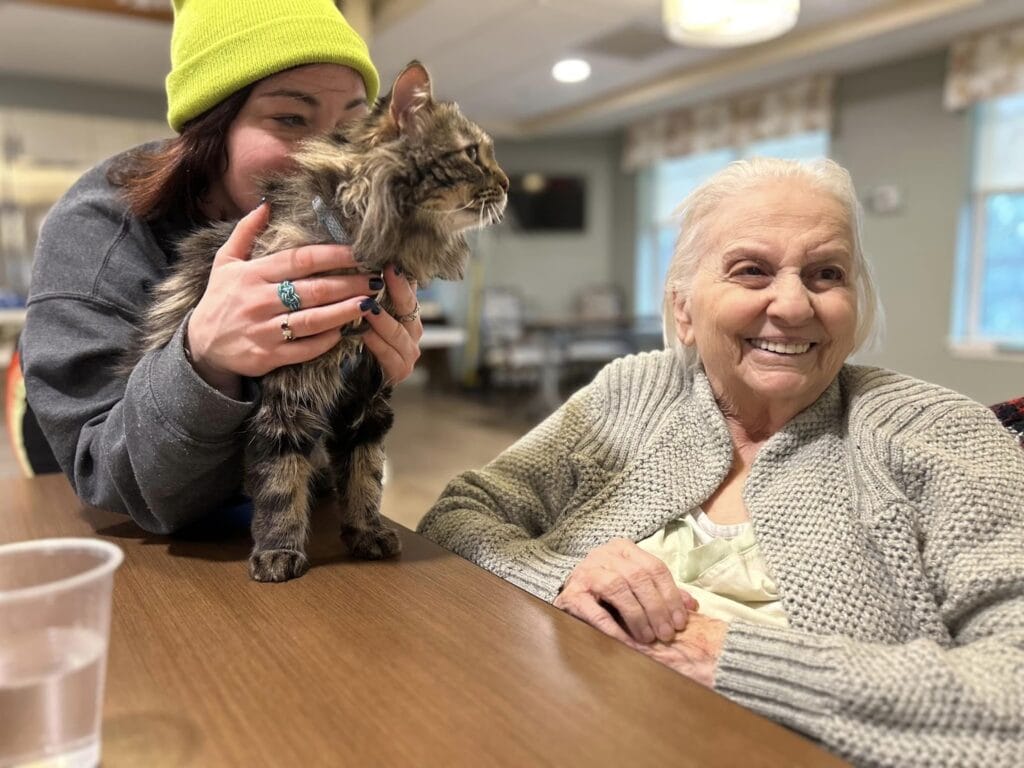Words can heal, but can also cause tremendous harm. The saying, “The pen is mightier than the sword,” couldn’t be truer. And when it comes to memory loss, there are more than 20 things you should never say to someone with dementia.
What’s more, knowing what’s kind and compassionate — and what’s downright hurtful — can be a real challenge. One minute, your loved one may feel great, and the next the two of you are arguing.
So, how can you have healthier conversations with people with dementia? What do you say, and what do you avoid?
Village Green here: we’ve got the answers for you.
For more than 30 years, our caregivers and memory care staff have provided assisted living and dementia care to individuals with dementia and other forms of memory loss. We’d love to be of service to you.
If you’re wondering what’s helpful — and not useful — to say to someone with dementia, look no further. Here are 20 phrases, words, and topics to avoid saying to a person who’s diagnosed with dementia and other forms of memory loss.
20 things not to say (or do) to someone with dementia
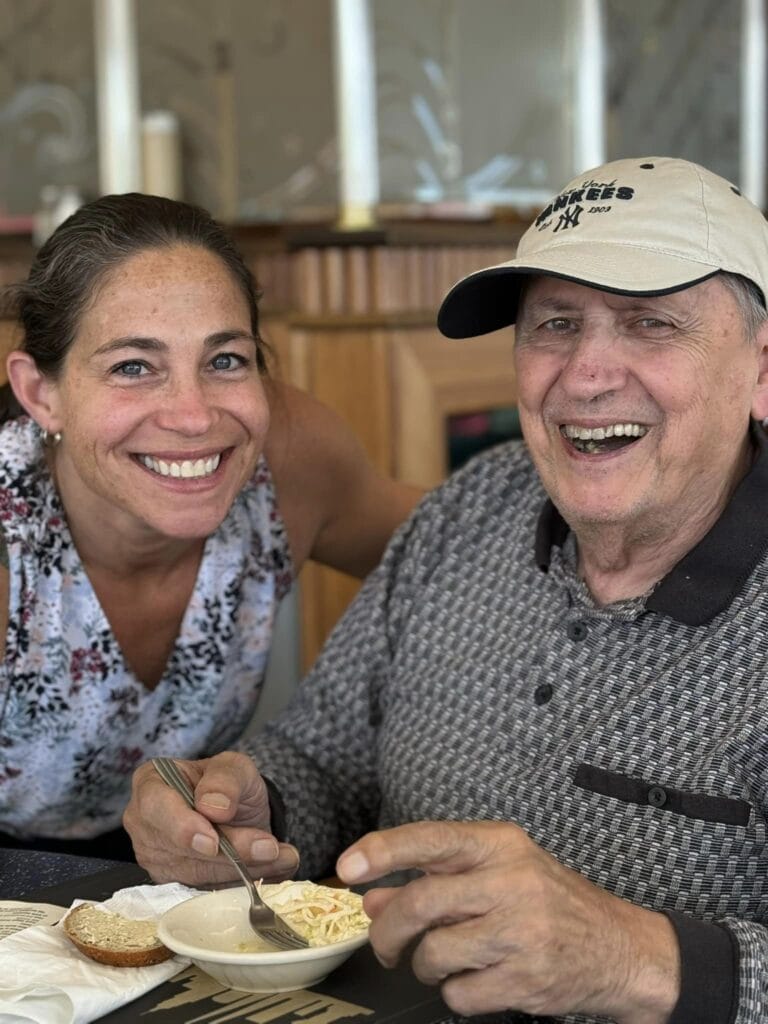
In most cases, keeping in mind the general principle, “Do not do unto others as you would not want done unto yourself” applies to a person with dementia. Most of the items on our list revolve around treating a person with kindness, compassion, and humanity.
The 20 things not to say (or do) to someone with dementia are:
1. Don’t argue
2. Don’t confront
3. Don’t blame
4. Don’t say “You’re wrong!”
5. Don’t remind them they forgot something
6. Don’t question their recent memory
7. Don’t hold resentment
8. Don’t take it personally
9. Don’t remind them of events they don’t remember
10. Don’t use long, complex sentences
11. Don’t remind them of something you just mentioned
12. Don’t refer to people as “demented”
13. Don’t use pet names like “honey” or “lovey”
14. Don’t assume they can’t answer for themselves
15. Don’t assume they don’t have feelings
16. Don’t assume a person can’t communicate even if they can’t speak
17. Don’t use the words “living with dementia” unless a person is clinically diagnosed with dementia
18. Don’t victimize or call people with dementia “victims”
19. Don’t talk about them with someone else if they’re in the room
20. Don’t say, “You don’t look like you have dementia”
1. Don’t argue
People with dementia can be forgetful. That doesn’t mean we need to argue back and forth over who is right or wrong.
After all, they’re living with a memory condition.
Instead, what you can do is allow plenty of time for comprehension and understanding. Whatever amount of time you think your loved one needs, we advise tripling that estimate to allow for more time.
2. Don’t engage in confrontations
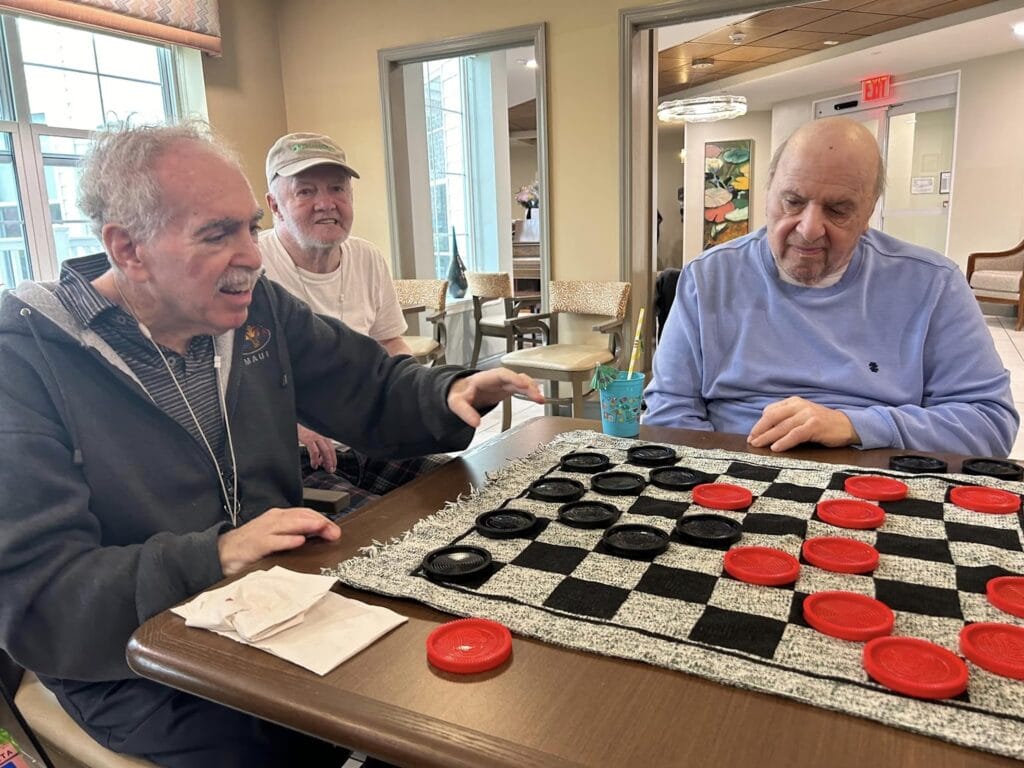
Confronting someone who’s forgetful is a losing battle for both you and the person on the other end. Communicating with someone with a dementia diagnosis is all about patience and kindness.
If you find your loved one becomes confrontational, avoid being insistent. Instead, be gentle, redirect, and try speaking with them again later when they’re calm.
3. Don’t blame
Playing the blame game never helps anyone.
If your loved one begins to blame you — or if you have a desire to blame them — pause.
If you are indeed in the wrong, accept responsibility when you’ve done something wrong (even if what your loved one is saying is fantasy).
Be patient, cheerful, and reassuring at every step of the way. We’d hate for you to say something hurtful and frustrating to your loved one.
4. Don’t say, “You’re wrong!”

When talking with patients with dementia, you’ll want to know how to talk with kindness. Focus on the facts, but keep the conversation tone friendly. And avoid making judgments like, “You’re wrong!”
If indeed your loved one is incorrect, do your best to respond with patience. Remember to separate the disease from the person: the person is not wrong. They are simply responding in line with the type and stage of their disease which is causing them to be forgetful.
5. Don’t remind them they forgot
For dementia patients, reminders of their disabilities —and reminders that they somehow have forgotten something — can be insulting and painful. Dementia can be challenging enough as it is, so reminding patients that they forgot what happened adds insult to injury.
Instead, gently redirect their attention to the task at hand. Make sure to allow plenty of time for them to understand your request.
6. Don’t question their recent memory

Someone living with dementia may not be able to remember events that occur earlier in the day, or even just a few moments ago.
Remember that you’re talking to and caring for someone who needs your support. What you can do is acknowledge what they said, be patient, remain cheerful, and discuss the topic you intended to cover with them.
7. Don’t hold resentment against the person
A person living with dementia may not have the cognitive abilities needed to recall or hold important memories in mind. They may ask a question several times, or even become irritable when trying to remember what they were talking about.
Whether they become angry with you or forget what they were talking about, don’t hold resentment against the person. Instead, do your best to communicate with kindness and patience.
After all, you’re talking to a person who needs more time to process information than yourself. Therefore, you’ll want to make sure the person is feeling supported at every step of their journey.
8. Don’t take their words or actions personally

Friends and family members of those living with dementia: sometimes our loved ones living with dementia may become upset with the fact that they have memory problems.
They may struggle to communicate their intentions. As a result, they may be unkind or act out in ways that can feel like they’re attacking you.
Remember that the person is dealing with a health condition. If you feel that the person isn’t in the best place to talk, you can change the subject, avoid the question, or give yourself (and the person) some time to process your actions.
When you’re ready — and you’re both in a calm state of mind — you can continue to talk with and help out your loved one.
9. Don’t remind them of events that they don’t remember
While we might think giving a person a gentle reminder about what they forgot can be helpful, questions like ‘Remember when…?’ or ‘Do you recall when we…?’ can be frustrating and painful for a person living with dementia.
A person with dementia may even feel like they’re being tested. If they can’t remember, they might despair or feel dejected.
Instead, with your loved one, you can recall comforting and pleasurable experiences of the past. Do your best to lead the conversation and allow the person living with dementia to join in, as this approach is the most helpful way to help people with dementia to recall past events.
10. Don’t use long complex sentences

“Do you remember that time when we went to the park, and then we grabbed ice cream, but you couldn’t be bothered to clean up that silly little dab of ice cream that fell on your shoe, because you wanted to allow the dog to have a little snack off your shoe, and we all laughed?”
For a person living with dementia, cognitive abilities slow down. Therefore, long, complex sentences are difficult to grasp.
Giving directions one step at a time can be a more helpful way to engage with a person with late or early dementia.
First, wait until you have the person’s full attention before talking. Then, try short, simple sentences. Finally, avoid talking in loud or busy environments where meaning can be lost in translation.
For a person with dementia, good communication involves keeping sentences simple. By avoiding asking too many questions and discussing multiple talking points in one sentence, you can create a conducive atmosphere for conversation for people with dementia.
11. Don’t remind them of something you just mentioned
“But I just told you about (insert topic) here, remember?” While we may be tempted to jog a person’s memory by saying, “I already told you about this!” or something of that nature, we need to do our best not to remind them of what we just mentioned.
Yes, it can be difficult to answer questions multiple times. Yes, we may have repeated ourselves two or even three times.
But, reminding them that you just mentioned something won’t help the person answer the question you asked. After all, a person with dementia may feel like they asked their question for the first time.
When you remind a person with dementia that they’ve asked the question several times, they can feel hurt. They might even be feeling embarrassed that they troubled you.
Instead, remind yourself to be patient always, both with yourself and the person in front of you.
12. Don’t refer to people with dementia as “demented”
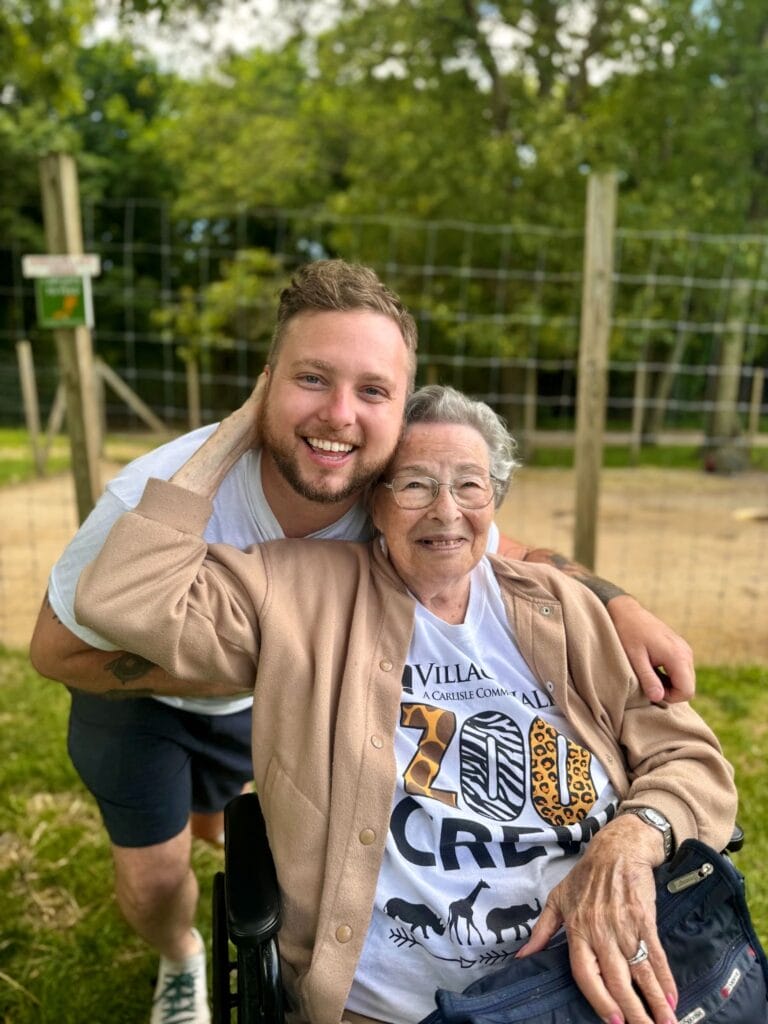
This one goes without saying: referring to a person by their condition can be demeaning. Instead, use person-first language, such as “a person with dementia.”
Also, unless the person has been diagnosed by a clinical professional with the condition of dementia, don’t refer to someone as demented. Even if your loved one may be forgetful, avoid using language that labels a person by their condition instead of the lovable human that they are.
Tip: explore memory care facilities for caregiving support
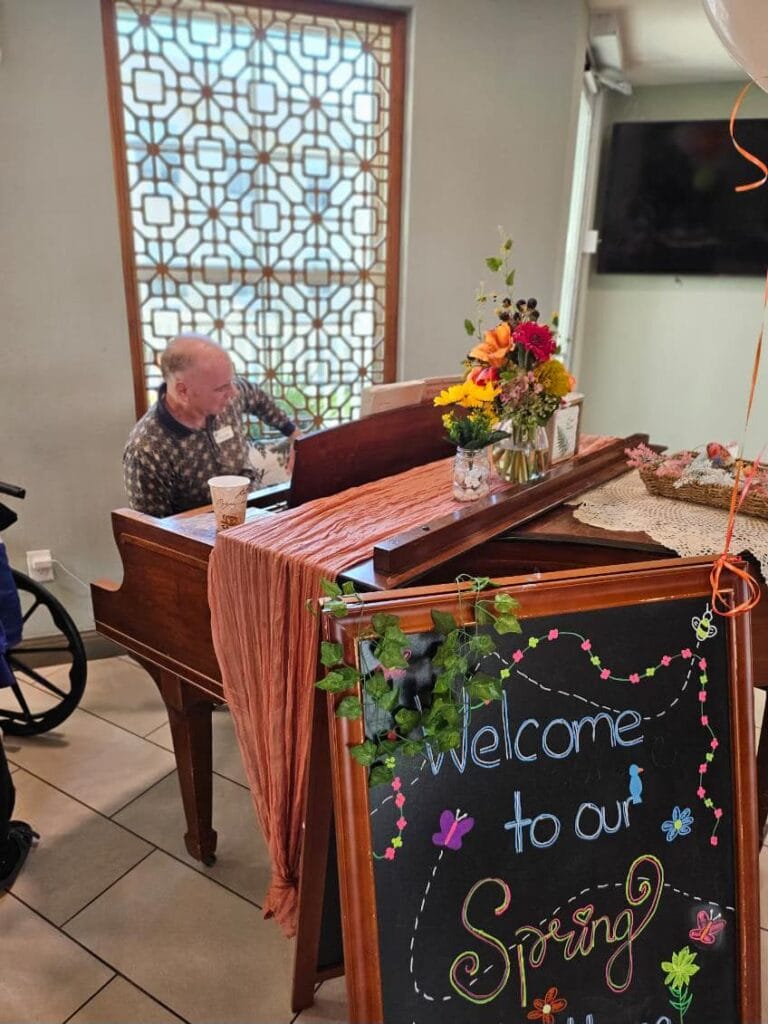
Throughout the year, we like to invite our professional partners and prospective families to visit. As such, we hosted our Spring Open House this past April.
It was a great day that was joined by our professional partners along with some new friends. The food and live music were amazing, and we’re so grateful for everyone that stopped by.
Check out all the fun here on our Facebook page!
13. Don’t use pet names like “honey” or “lovey”
Using pet names like “deary”, “lovey,” “honey,” or “baby” is a no-no. Also, talking in simplified registers and using a high-pitched tone — often called “elderspeak” — can be infantilizing and insulting.
Instead, remember the person inside. A person with dementia may need you to speak a little slower and with simple language, but not like a child.
Instead, keep your tone of voice the same as you would when talking with anyone else, and be patient and kind always.
14. Don’t assume people with dementia don’t have feelings

People with dementia are still just that: people. Don’t assume that just because they experience memory loss doesn’t mean you can’t hurt their feelings.
As a result, you’ll always want to make sure to be kind and compassionate in every interaction you have with someone with dementia — just as you would with any other person without dementia.
15. Don’t assume that a person can’t answer for themselves
Though communication can become a bit of a challenge, you should never assume that a person with dementia can’t answer questions for themselves.
Instead, consider asking open-ended questions and allowing more time for each interaction. Whether living with Alzheimer’s disease, vascular dementia, or another type of dementia, allowing the person to answer questions instead of piping up on their behalf ensures you honor their humanity and treat them with dignity and respect.
16. Don’t assume a person can’t communicate even if they can’t speak
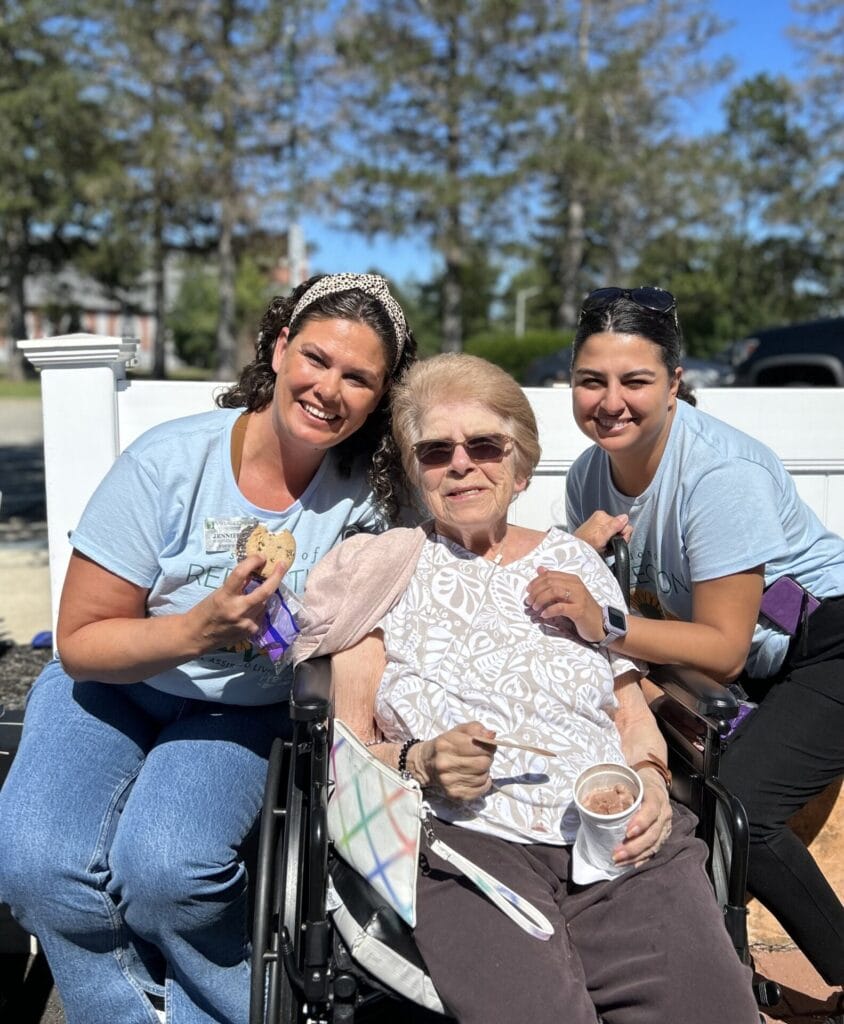
Especially as dementia patients age, communication can become more challenging. Even if a person with dementia can’t speak, remember many forms of communication exist and can be used.
Pointing, using hand gestures, smiling, laughing, holding a person’s hand, and using more pronounced facial expressions can help you communicate with someone who’s non-verbal and living with dementia.
17. Don’t say, “You’re living with dementia” unless the person has a dementia diagnosis
Speaking of “living with dementia,” unless the person has a clinical diagnosis of dementia, avoid using terms like “you’re living with dementia” or “you’re struggling with Alzheimer’s.”
These terms are inaccurate at best, demeaning at worst, and insulting across the board. Always remember to keep communication kind and compassionate — that goes for people with and without dementia.
18. Don’t call people with dementia victims

Living with memory loss at any age can be difficult. How much more so for people with dementia.
With that being said, people with dementia are not “victims” or “sufferers” of their condition. As a result, using victim-based language can be demoralizing and doesn’t acknowledge the gifts that the person brings to the world.
Do your best to acknowledge all the gifts they bring to the world. Celebrate their relationship with you and other loved ones, and acknowledge the gifts they’ve offered — and can still offer — the world.
19. When a person with dementia is present in the room…
Imagine someone not acknowledging your presence but talking about you while you’re in the room. You wouldn’t feel very great, would you?
Neither do people living with dementia.
Just because a person may be experiencing memory loss doesn’t mean we ought to talk about them to someone else because we think they won’t remember that we talked about them.
Like you would with another family or friend — and regardless of the stage of dementia a person is in — remember to always treat them with dignity. If they’re in the room and you’re talking about them, always include a person with dementia in the conversation.
20. Don’t say, “You don’t look/sound like you have dementia.”
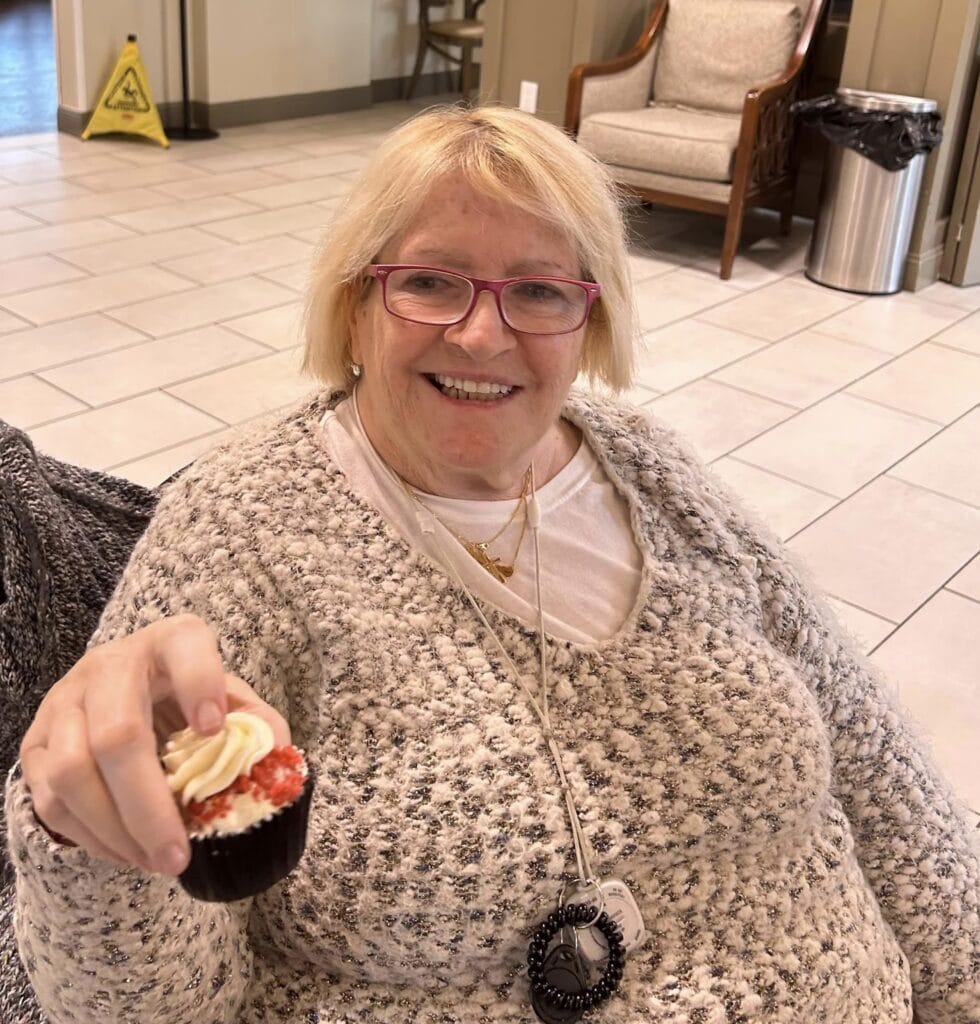
Mentioning that a person doesn’t seem like they have dementia can make a person feel like you’re minimizing their experience. Caregivers, family members, and friends: while we might think what we’re saying is a compliment, a person with dementia may feel you’re belittling them.
While a person may need reassurance about their condition from time to time, saying that a person doesn’t look like they have dementia may do more harm than good.
Acknowledge what they can do, and celebrate the person that they are. You know your loved one best. Since everyone needs encouragement, give them the encouragement you know will best help your loved one thrive.
Bonus: Don’t give up on people with dementia

Treating people with dignity, and giving them the right types of treatment is kind and generous. But one of the most important lessons that living with dementia can teach family and friends is to be persistent.
Don’t give up on treating your loved one with dignity, respect, and love just because they’re experiencing memory loss or may upset you. Remind yourself often of why you love them and what they contribute to you and the world.
Doing so will ensure that you’re there for your loved one in a spirit of joy, kindness, generosity, and love.
Table: What to say (and not to say)
| What not to say to someone with dementia | What’s healthy and helpful to say to someone with dementia |
| 1. Don’t argue. 2. Don’t confront. 3. Don’t blame. 4. Don’t say, “You’re wrong!” 5. Don’t remind them they forgot something. 6. Don’t question their recent memory. 7. Don’t hold resentment. 8. Don’t take it personally. 9. Don’t remind them of events they don’t remember. 10. Don’t use long, complex sentences. 11. Don’t remind them of something you just mentioned. 12. Don’t refer to people as “demented.” 13. Don’t use pet names like “honey” or “lovey.” 14. Don’t assume they can’t answer for themselves. 15. Don’t assume they don’t have feelings. 16. Don’t assume a person can’t communicate even if they can’t speak. 17. Don’t use the words “living with dementia” unless a person is diagnosed with dementia. 18. Don’t victimize or call people with dementia “victims.” 19. Don’t talk about them with someone else if they’re in the room. 20. Don’t say, “You don’t look like you have dementia.” | 1. Give short explanations. 2. Allow plenty of time for a person living with dementia to comprehend your words. 3. Repeat instructions the same way and with the same tone. 4. Avoid insisting. If needed, you can try reaching out again later. 5. Agree with or distract the person to a different subject if needed. 6. Accept responsibility when something occurred that is wrong (even if it may not have happened in reality). 7. Leave the room if needed to avoid unwanted confrontations. 8. Respond to and acknowledge the other party’s feelings. 9. Be patient, cheerful, reassuring, and kind always. 10. Do your best to go with the flow. Practice forgiveness, as memory loss can change day-to-day. 11. Remember to treat the person with humanity and dignity. 12. Do your best to try to understand their condition — judge the person living with dementia with kindness always. |
Village Green: providing compassionate and complete caregiving to people with dementia
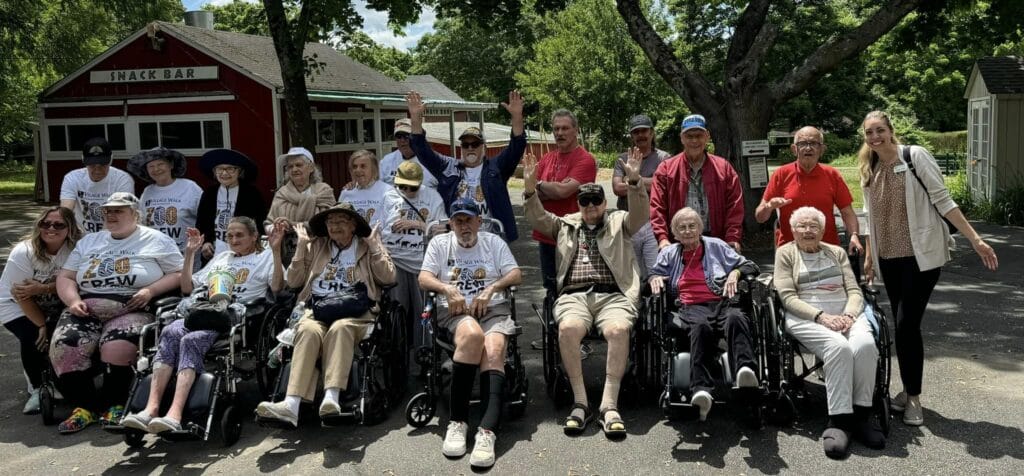
When it comes to dementia, there are just as many “don’ts” as there are “do’s.” What’s more, as the disease progresses, you may choose to change the way you interact with your loved one.
When it comes to the “don’ts,” here are a few general principles to keep in mind:
- Don’t reason
- Don’t argue
- Don’t confront
- Don’t ask a person “do you remember (insert topic here)?”
- Don’t question their memory
- Don’t take off-hand comments personally
Just as many are the amount of “do’s” to practice with people living with dementia. Try these 7 things to ensure better relationships when it comes to addressing people with dementia:
- Do make dementia patients feel heard
- Do be sensitive about mentioning a loved one’s death, as people with dementia may have trouble remembering that the death occurred.
- Do keep the nature of your conversations helpful and uplifting
- Do treat others as you would want to be treated
- Do be patient, kind, and compassionate
- Do reassure them you are there for them to be a support for them
At Village Green, we’ve been supporting people with dementia and their families and friends with comprehensive caregiving and quality long-term care and assisted living options. Our “Meet Me Where I Am” memory care program is built on the foundational principle that when we respect each individual for where they are, we can better support them in living their best life possible.
Whether you’re a family member, friend, or caregiver to a loved one with dementia, we’re here for you. To learn more about what our Village can do for you, don’t hesitate to contact us today!
FAQ about what not to say to people with dementia

What are the 20 things I shouldn’t say to someone with dementia?
Avoiding these 20 things will help you and your loved one live with vitality, grace, and dignity. The 20 things people shouldn’t say to or do with someone with dementia include:
1. Don’t argue
2. Don’t confront
3. Don’t blame
4. Don’t say, “You’re wrong!”
5. Don’t remind them they forgot something
6. Don’t question their recent memory
7. Don’t hold resentment
8. Don’t take it personally
9. Don’t remind them of events they don’t remember
10. Don’t use long, complex sentences
11. Don’t remind them of something you just mentioned
12. Don’t refer to people as “demented”
13. Don’t use pet names like “honey” or “lovey”
14. Don’t assume they can’t answer for themselves
15. Don’t assume they don’t have feelings
16. Don’t assume a person can’t communicate even if they can’t speak
17. Don’t use the words “living with dementia” unless a person is diagnosed with dementia
18. Don’t victimize or call people with dementia “victims”
19. Don’t talk about them with someone else if they’re in the room
20. Don’t say, “You don’t look like you have dementia”
What can I say to someone with dementia?
What you can say to (or do) with someone with dementia includes:
- Give short explanations.
- Allow plenty of time for a person living with dementia to comprehend your words.
- Repeat instructions the same way and with the same tone.
- Avoid insisting. If needed, you can try reaching out again later.
- Agree with or distract the person to a different subject if needed
- Accept responsibility when something occurs that’s wrong (even if it may not have happened in reality)
- Leave the room if needed to avoid unwanted confrontations
- Respond to and acknowledge the other party’s feelings
- Be patient, cheerful, reassuring, and kind always
- Do your best to go with the flow
- Practice forgiveness, as memory loss can change from day to day.
- Remember to treat the person with humanity and dignity
- Do your best to try to understand their condition — judge the person living with dementia with kindness always
How can I care for my loved one if they stop speaking?
As the share of those with Alzheimer’s aged 75-84 years old climbs higher and higher (Statista, 2024), learning how to care for a loved one if they stop speaking becomes ever more important.
Using non-verbal communication plays a large role in ensuring successful care for a person living with dementia. Smiling, holding a person’s hands, expressing clear facial expressions, using hand gestures, and laughing with a person with dementia can be a helpful way of communicating with non-verbal dementia patients.
“The staff are so friendly. We’re very happy with our choice.”
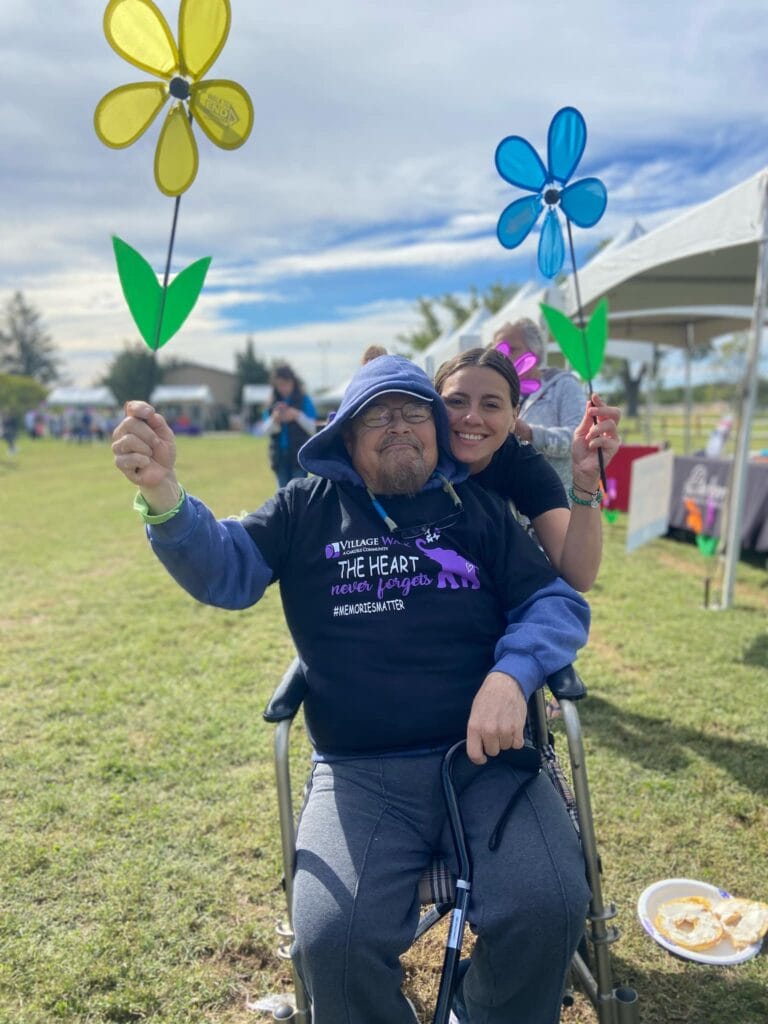
My dad has been living at Village Green for one year. He’s in the memory care unit.
My dad has made friendships with other residents. He participates in the numerous activities that the staff plans, for example, he’s played wiffle ball and has danced to the musical entertainers that come to perform weekly.
He’s happy and comments that he “loves this place!” The staff are caring and so friendly.
We are very happy with our choice!” – Theresa D., grateful Village Green family member.

